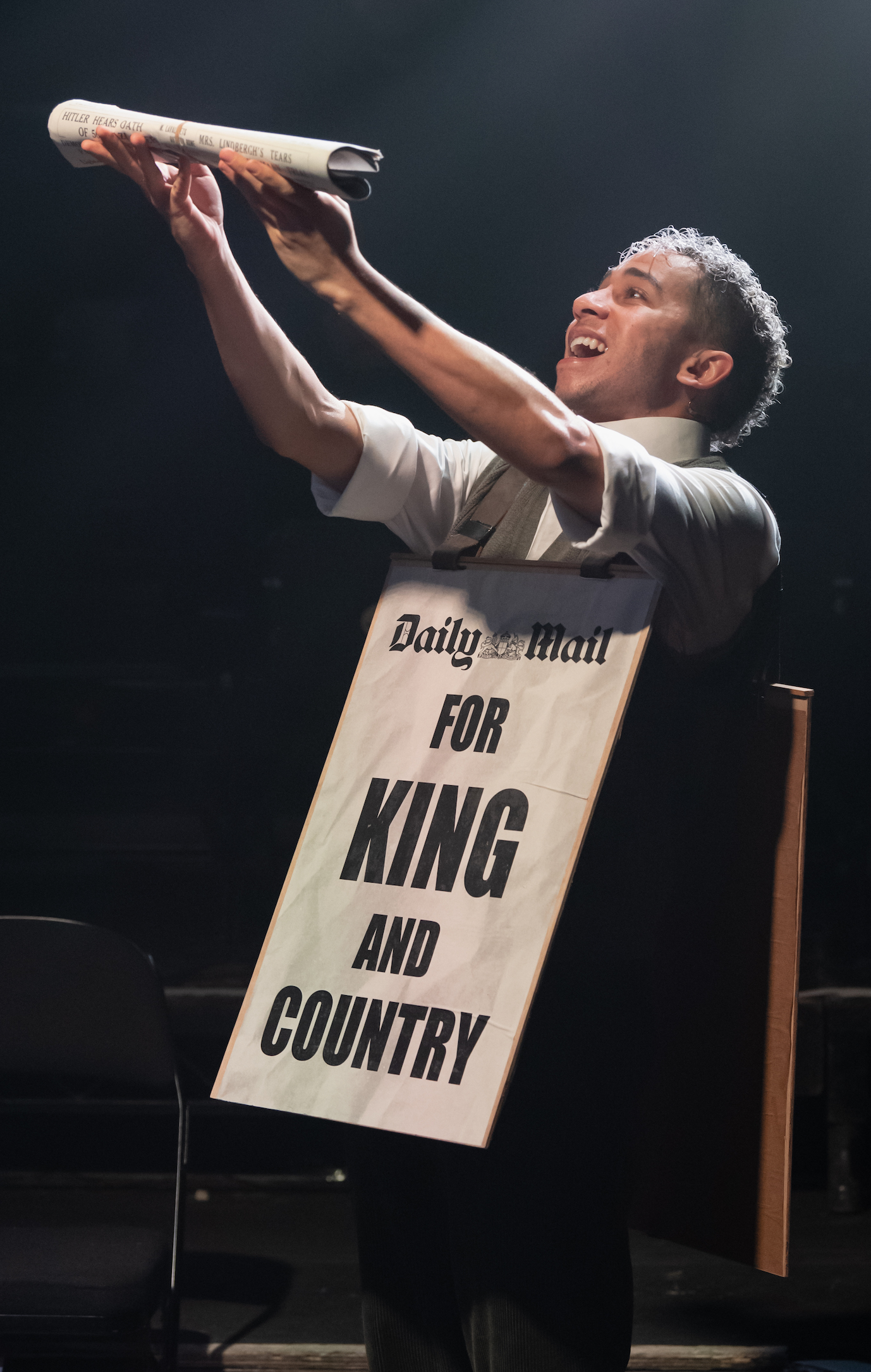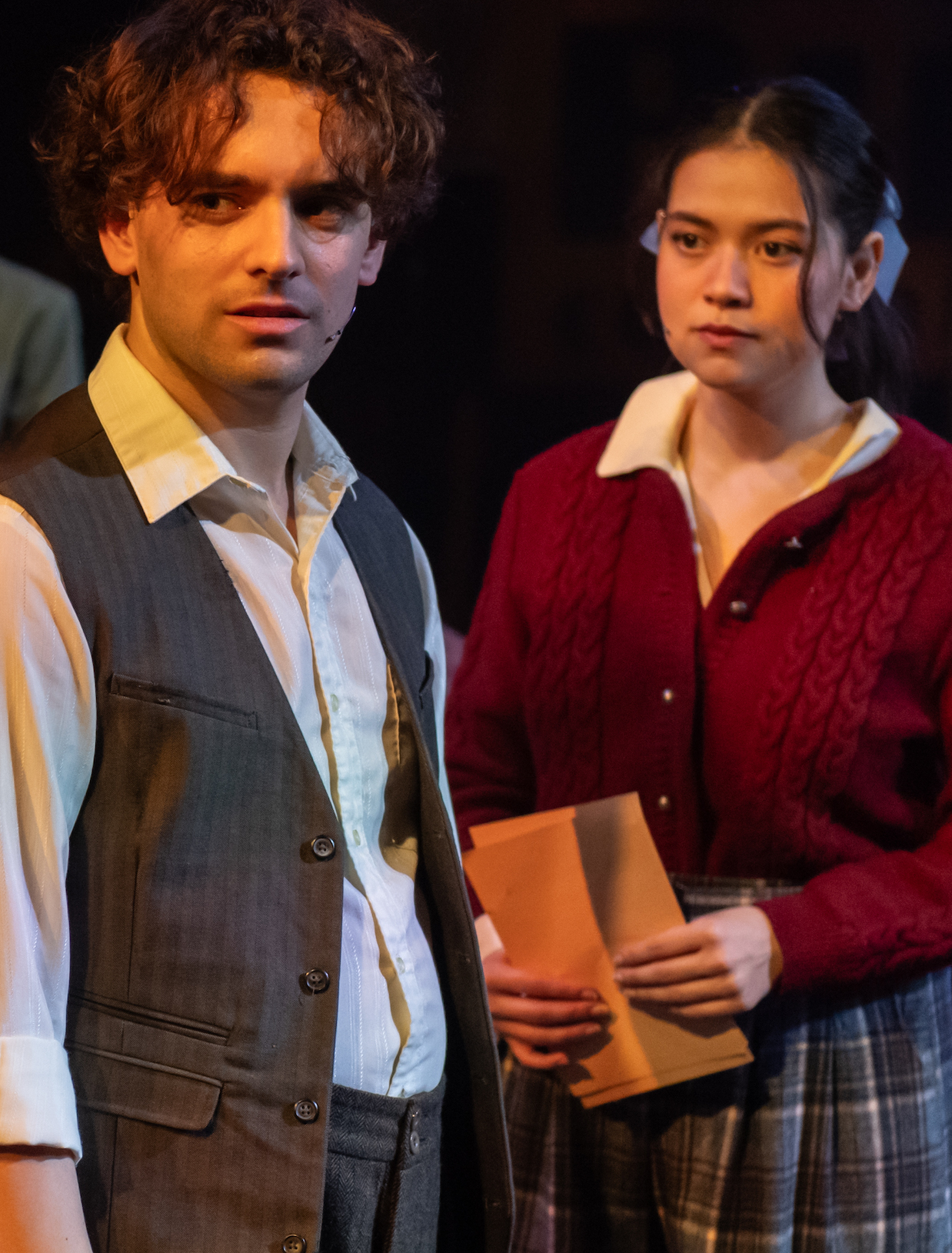Hot on the heels of Brigid Larmour’s updating of The Merchant of Venice to the East End in 1936, a spirited new musical across town at Southwark Playhouse is tackling the same topic: the impact of rising British fascism in the same era, culminating in the clash between locals with Oswald Mosley’s British Union of Fascists (BUF) on the streets of Bethnal Green.
What Larmour couldn’t do as thoroughly as Cable Street does is give a kaleidoscopic view of the terrain. The East End of the 1930s presented here is home to two waves of immigrants in particular: Jewish refugees from Eastern Europe’s pogroms, living side by side with Irish dockers’ families.
The show by Tim Gilvin and Alex Kanefsky uses a split timescale, so that we first see the district in the present day, loudly touting its “Best Indian Restaurant” wares and hosting Ripper tours for true-crime ghouls. The descendant of one of the area’s 1930s residents (Debbie Chazen, in the first of many roles) is visiting the old neighbourhood from New York and joins the tour of a guide (Jez Unwin, also in two other roles), who offers a deeper dive into the complex nature of the local community.
Two sets of the 1930s protagonists live in a block optimistically called Camelot Mansions, and they are the Scheinbergs and the Williamses. Yitzhak Scheinberg (Unwin again, who also plays the BUF recruiter) is the head of a large family, one of whom, Moishe (Ethan Pascal Peters), is a Talmud scholar; his elder boy, Sammy (Joshua Ginsberg), is a hothead looking for work but finding himself drawn to a young Irish communist, Mairaid (Sha Dessi), and her cause. She works all hours at the Jewish bakery and helps her widowed mother (Chazen) with her sister’s baby; somehow, she also finds time to write stirring poetry.
 Sammy’s near-neighbour Ron Williams (Danny Colligan), a northerner whose mother Edie (Sophia Ragavelas) is a war widow slowly pickling in gin, is also finding work impossible to come by, but blames this on the Irish gangmasters, who only choose their own; in Jewish-owned workplaces he feels similarly spurned. His growing bitterness as a neglected native-born Englishman is a gift for the BUF recruiters, who indoctrinate him in the myth that rich Jews own the world and are responsible for all its ills. This fire is further stoked by a belligerent local police force, who are sent reinforcements by the government – to protect the BUF. Four newspaper sellers, from the Daily Mail to the Jewish Chronicle, add to the sense of complex warring forces, popping up to sell their papers’ differing editorial lines on the BUF’s activities. Peters (pictured right), in a voice dripping with bumptious English entitlement, makes the Mail seller especially repellent.
Sammy’s near-neighbour Ron Williams (Danny Colligan), a northerner whose mother Edie (Sophia Ragavelas) is a war widow slowly pickling in gin, is also finding work impossible to come by, but blames this on the Irish gangmasters, who only choose their own; in Jewish-owned workplaces he feels similarly spurned. His growing bitterness as a neglected native-born Englishman is a gift for the BUF recruiters, who indoctrinate him in the myth that rich Jews own the world and are responsible for all its ills. This fire is further stoked by a belligerent local police force, who are sent reinforcements by the government – to protect the BUF. Four newspaper sellers, from the Daily Mail to the Jewish Chronicle, add to the sense of complex warring forces, popping up to sell their papers’ differing editorial lines on the BUF’s activities. Peters (pictured right), in a voice dripping with bumptious English entitlement, makes the Mail seller especially repellent.
As the day of the Mosley march approaches, the residents marshal their forces, shoulder to shoulder. But this is no idealistic moral tale: the older residents still cling to their prejudices – Mairaid’s mother blames the Jews for bringing trouble to the area; Sammy’s father urges calm and keeping their heads down, fearful of retribution. The ending is by no means pat: better together, yes, but the Battle of Cable Street is only the beginning of the fight against fascism and of alliances among workers of different origins. Even the generations are still at war, Mairaid accusing her mother of living in the past, Sammy shouting at Moishe that “elderly Jews with beards arguing about the Talmud won’t save us from Hitler!” The young are looking outwards to the endangered wider world, the older people looking inward for a sense of security.
On paper, this reads like a serviceable drama about a precarious time in British history. What elevates it into an impressive experience is Adam Lenson's staging, the score and the performances. You feel the influence of Hamilton, a drama that operates on both domestic and historical levels at once. The result is not super-sophisticated but doesn’t need to be:
In the smallest of spaces, with just some scaffolding, chicken wire and corrugated iron sheets overhead, the 11 performers offer a classic demonstration of “offie” skills. Swapping hats and shawls as they assume their multiple identities, they speed from scenario to scenario, dancing and singing, two of them intermittently playing instruments too, so that the action never loses its grip (though accents slip a bit from time to time). When we finally get to the battle of Cable Street, the result, in choreography by Jevan Howard-Jones, is thrilling
 Accompanied by three hidden musicians, much of the singing is worthy of a West End production (some of the cast have credits there already). Dessi’s Mairaid and Ragavelas’s Edie have belting voices, Ginsberg’s Sammy (pictured left, with Sha Dessi) proves a punchy rapper, Unwin can deliver a gentle, sad ballad as well as barking out the BUF’s anthem; and soaring above them all is the voice of Colligan’s Ron, the bitter left-behind man who looks for somebody in the wrong places for somebody to blame. When he first lifts his arm in a fascist salute at the end of one number, for the first time the audience responds with stony silence.
Accompanied by three hidden musicians, much of the singing is worthy of a West End production (some of the cast have credits there already). Dessi’s Mairaid and Ragavelas’s Edie have belting voices, Ginsberg’s Sammy (pictured left, with Sha Dessi) proves a punchy rapper, Unwin can deliver a gentle, sad ballad as well as barking out the BUF’s anthem; and soaring above them all is the voice of Colligan’s Ron, the bitter left-behind man who looks for somebody in the wrong places for somebody to blame. When he first lifts his arm in a fascist salute at the end of one number, for the first time the audience responds with stony silence.
Composer-lyricist Gilvin’s songs, in a mix of contemporary styles, have pithy and often poignant lyrics – starting with a real bang as Sammy raps about “My Street”, then broadening to powerful ballads such as his sister Rosa’s (Jade Johnson) “Stranger/Sister”, about the need to learn to like people who live very differently from you, and Yithzak’s sorrowful “Only Words”, with the sad line “We are only strangers here”. Ron sings with rising anger about English land needing to be worked by his English hand; but by the end, he has found acceptance from an unlikely source and recognition of where his home is and who belongs there.
This engaging production deserves a run in a (slightly) less constricted space.















Add comment